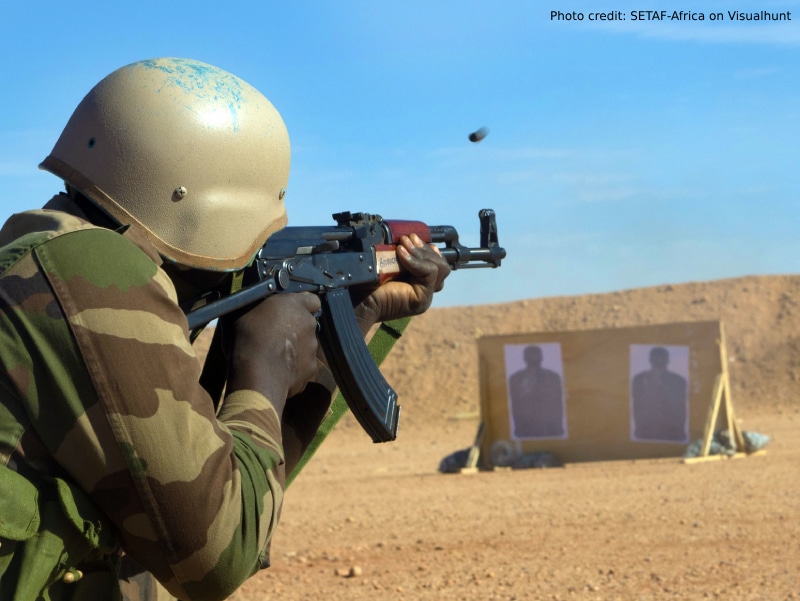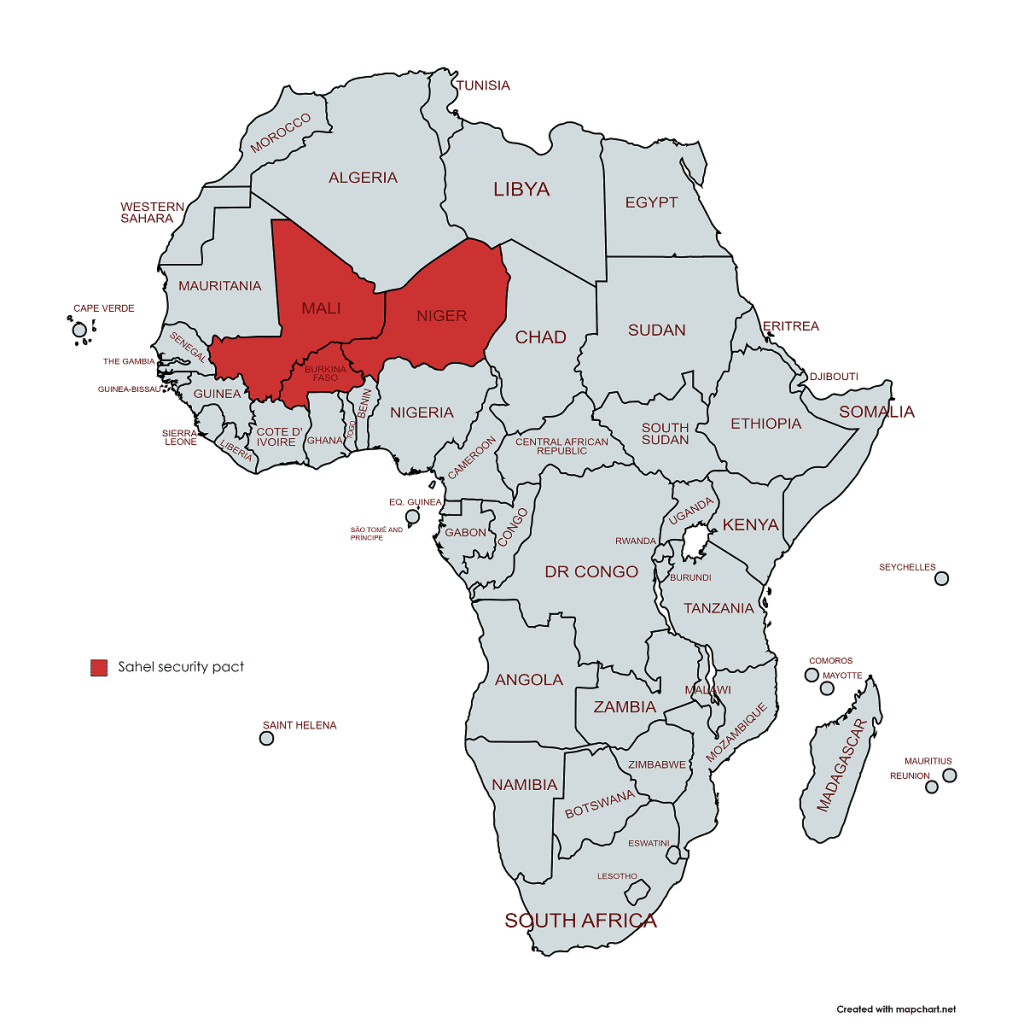
The Republic of Niger, a country that came into the global spotlight after the military coup on July 26 last year, has long been facing serious security challenges. The recent official visit to Mali by the coup leader, General Abdourahamane Tchiani, have raised concerns about security in the broader Sahel region. Violent change of power, led by General Tchiani, the head of the presidential guard, resulted in a deep political crisis in the country and raised numerous questions about future events in this part of the world. Therefore, the most significant question arises about Niger's fate after the expulsion of the French ambassador and the withdrawal of French military forces from the country at the end of last month, and who will fill the newly created power vacuum. If this African state follows the path of the Republic of Mali and Burkina Faso, it seems inevitable that there will be a closer alignment with the Russian Federation.
The takeover of power by the military in July led to the overthrow of the previously democratically elected government and the disruption of the constitutional order, resulting in expected political instability in the country. The osted President of Niger, Mohamed Bazoum, was inclined towards the West, with Niger being a key ally of European countries involved in the fight against terrorism in the Sahel region. Additionally, a French military base with about 1.500 soldiers was located in this African country, and they completely withdrew from the country at the end of last month. On the other hand, as the activities of various extremist groups continued, anti-French sentiment among the local population grew, as seen earlier in neighboring countries, former French colonies. Therefore, it is not surprising that one of the first demands after the military junta took power was the earlier mentioned departure of the French ambassador and the withdrawal of their troops.
In addition to the newly emerged political crisis, Niger faces various other factors contributing to its complex situation, such as the presence of jihadist groups and their uprisings, ethnic tensions, economic insecurity, and tensions on the border with Mali and Burkina Faso, countries led by military juntas (Mali since August 2020, Burkina Faso since January 2022). Moreover, unlike other countries in the Sahel region, Niger is also threatened by serious socio-economic consequences, primarily caused by sanctions and the suspension of development and budgetary aid by the international community. It is essential to note that the economic situation is particularly alarming, given that Niger is one of the poorest countries globally. In such circumstances, there is an increasing rise in the prices of necessities, electricity shortages, border closures, and jeopardized delivery of humanitarian aid. As the situation worsens over time, this African country also faces the potential for military intervention by its neighbors and their allies.
However, the greatest security threat to the country remains terrorism. Countries like Niger, Burkina Faso, or Mali are ideal grounds for numerous activities of terrorist groups and organizations, as they exploit unstable and unregulated states to spread their ideologies. Factions, groups, and organizations such as Boko Haram or the Islamic State in the Sahel have taken advantage of political crises and the security vulnerability of the broader region to increase their presence and the frequency of their attacks. According to the Armed Conflict Location and Event Data Project (ACLED), just a month after the coup in Niger, militants from JNIM (Jama’at Nasr al-Islam wal Muslimin) and IS Sahel (Islamic State Sahel Province) carried out two deadly attacks in the Tillaberi region, resulting in the death of at least 40 soldiers. Given all these facts, it becomes questionable whether the new military government in Niger will be able to deal with all the internal problems mentioned and whether it will be able to ensure political stability and general security. Although the coup leaders claimed that insecurity, economic difficulties, and corruption were the reasons for taking power, it seems unclear, even after almost four months, whether there will be an improvement in the overall situation in the country. Additionally, despite the promises of the military junta's representatives in August to form a transitional government for a period not exceeding three years, along with an inclusive national dialogue, this has not yet occurred.
Moreover, it is essential to consider that internal conflicts, such as frequent interethnic clashes and unrest, also impact the complex security situation in the country. Hence, there is a justified fear of their resurgence, as the ousted President Bazoum comes from the minority Arab community, which may now feel neglected and marginalized. This potentially poses a trigger for future destabilization of the country, and the solution lies in a comprehensive political strategy and inclusion.
From all that has been mentioned, it seems that various scenarios for future developments in Niger are possible. On one hand, there could be a stabilization of the situation, the formation of a transitional government, and attempts to improve economic and security conditions in the country. On the other hand, there is concern about further deepening of the crisis and political instability, and even the potential intervention of countries gathered around the Economic Community of West African States (ECOWAS). Therefore, the renewal of the democratic order, addressing security challenges, reducing interethnic tensions in society, combating corruption, and reviving the economy are crucial for Niger's future.

However, the decision of the military junta representatives in Niger to initiate an agreement with military juntas in Mali and Burkina Faso after the coup indicates that their priority in the future will primarily be the preservation and protection of positions seized by the July coup. A sort of triple alliance was formed on September 16 last year, encompassing cooperation in the fight against terrorism and mutual assistance of the governments of the three countries in the event of rebellion or external threats. This provision seems to be a direct response from Niger to the potential aggression and threats of the use of military force by ECOWAS countries, which demanded that the coup leaders return power to democratically elected representatives, namely President Mohamed Bazoum. Considering this, it is clear that any further escalation and open armed conflict would have enormous negative consequences for both Niger and the broader Sahel region.
When it comes to external factors, it is also worth noting the increasing influence that the Russian Federation has in Niger, positioning itself in recent years as a carrier of anti-Western and especially anti-French sentiment, both in this country and in the previously mentioned Mali and Burkina Faso. In the first case, under the pretext of fighting terrorism, the military authorities in the Republic of Mali sought assistance from the Russian mercenary group Wagner, entrusting them with their security after previously demanding the departure of UN peacekeeping forces. However, instead of combating terrorism, the country plunged deeper into crisis, and the number of terrorist attacks increased, as the presence of about 1,000 Wagner soldiers was not sufficient to replace more than 13,000 UN personnel. Nevertheless, the Russian mercenary formation used Mali to establish a sort of base for further expanding its influence in West Africa.
Yet, when it comes to Russia's influence, it still seems to be very limited. African states are increasingly aware of how little benefit Russia can bring in terms of investments, trade, or creating new jobs. It is essential to keep in mind that for Russia, Africa primarily represents a stage for implementing its own geopolitical interests and acquiring resources such as diamonds and gold, with the stability of the continent taking.

